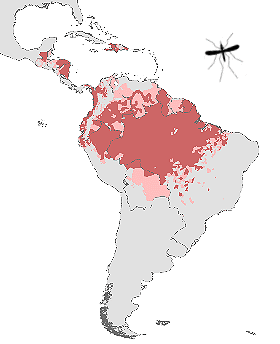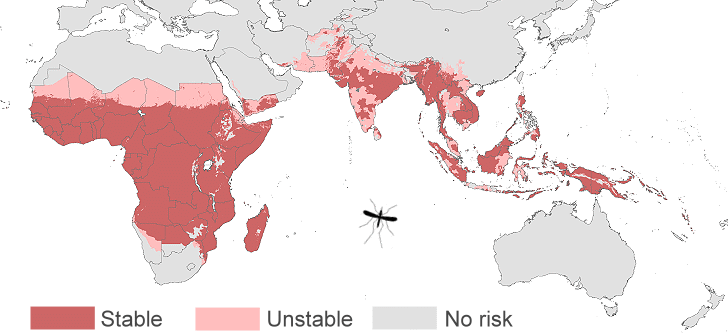
The red areas are the endemic areas of malaria. Pink areas announce reported cases where the disease may be absent from year to year.
Finally in the gray areas, mosquitoes sting, it scratches a little bit and that's all.
See below, which mosquitoes transmit what viruses and how to avoid them.
Maps of Malaria, Dengue, Zika and Chikungunya


Malaria: Anopheles mosquito
Malaria is a life-threatening disease. It is due to parasites of the genus Plasmodium which are transmitted by mosquitos of the infected type. they usually stings at nightfall (around 6pm to 7pm) and at sunrise (6am to 7:20am). As soon as the sun appears and warms the air, the mosquitoes disappear (most of the time).
As shown on the maps, malaria occurs mainly in the tropical regions of Africa, South-East Asia, Central America, South, Middle East, Pakistan, India and also a little in China.
prevention is only indicated when traveling to high-risk countries and areas. Information on the choice of preventive treatment should be sought before leaving. Some medications involve side effects, your doctor will tell you the most appropriate medication. Prophylactic treatment in prevention can not prevent malarial contamination, but it diminishes its strength. The three main active ingredients to use before and during the stay are mefloquine, atovaquone-proguanil and doxycycline.
Dengue, Chikungunya and Zika: Tiger Mosquito
These three viral infections are mainly transmitted between humans and mosquitoes and vice versa. They are fairly detailed on other specialized websites to not expand on the subject. Just be aware that the ugly tiger mosquito (Aedes Albopictus) carries these three diseases. The mosquito tiger is recognizable with its black and white stripes on the body and legs. Its size is less than that of the common Anopheles mosquito and its wings are completely black. Good point, it's easy to crush in flight because it's not very vivid. On the other hand, it likes to fly around the ankles so far from our eyes.
Its bite is benign although this mosquito can be a vector of diseases such as dengue, chikungunya or zika. However, in order to transmit these viruses to humans, it must first have stung a person already infected. Which limits the cases fortunately. The tiger mosquito most often establishes its quarters in the gardens of the inhabitants around the stagnant water reserves and it is very difficult to dislodge it without a specialized team.
The war against the mosquitoes!
Avoid mosquitoes before they sting: wear long-sleeved clothing and light pants, closed shoes and socks, especially at dusk. Buy local repellents only because they do not work elsewhere in general. Apply repellent to areas of exposed skin and if possible, spread a mosquito net around the bed.
In your hotel room, you will enjoy your air conditioning to prevent mosquitoes from getting into it, they do not like the cold. Do not leave your room door open at all times, especially at nightfall!
A very good advice, especially do not buy mosquito repellent in your native country before leaving in the tropics because the exotic mosquitoes make fun of the lemongrass! Plan to purchase an effective product such as DEET 50% up to 100% which is a synthetic repellent recognized to be the most effective to date and recommended for tropical areas especially in areas with mosquito vectors diseases.
This repellent is not recommended for children under 12 yo and pregnant women with a 50% dosage, in these cases use DEET 30%. The latest recommendations from the health authorities recommend its use in zones with a proven risk for children from 6 months and for pregnant or lactating women. In this case, it is imperative to have a medical opinion.
Warning to watches, glasses, contact lenses, DEET being aggressive with some plastics and varnishes. Also, DEET decreases the effectiveness of sunscreen by about 30%, think of choosing a sunscreen with a higher protection factor or put the sunscreen first and about 20 minutes after applying the repellent . Remember to renew the spray on clothes and body at least every 4 hours. Avoid breathing during spraying, needless to say!
